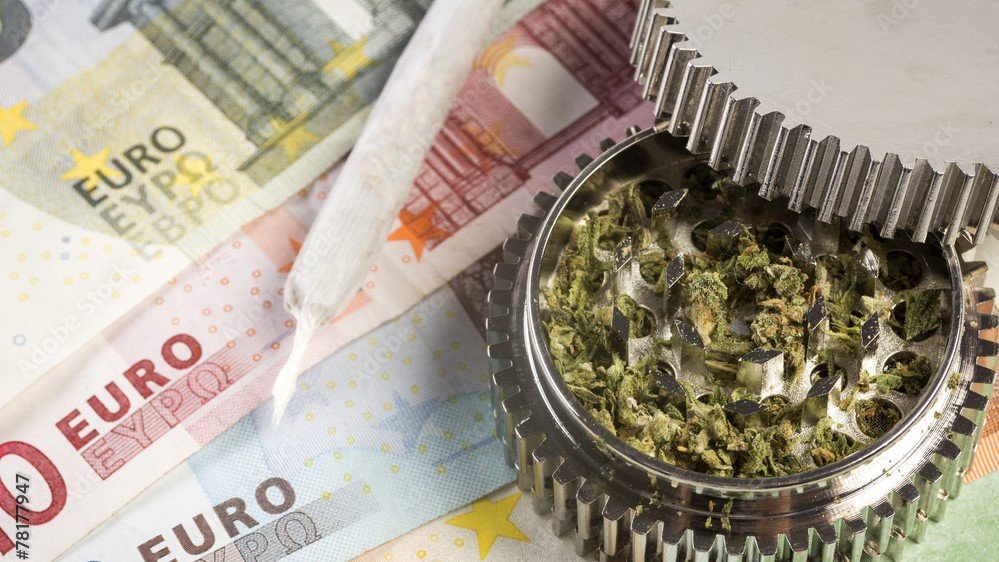
The Social Cost of Cannabis in France
France has the highest consumption of cannabis in Europe, alongside Spain. In 2017 11% of the population, and 21% of young adults (15-34 years old) reported using cannabis in the last year.[1] Yet France is also one of the countries with the most repressive legislation.
Can the French government continue to justify cannabis prohibition and the severe penalties in place, when statistics reveal this strategy to have had a limited impact on prevalence of use, whilst deleteriously impacting the lives of young people who choose to consume the plant?
The Political Attitude Towards Cannabis in France
In France, the possession, use, traffic and sale of cannabis are subject to criminal prosecution under the law of 31 December 1970. This is one of the toughest laws in Europe, as the mere use of cannabis can be punished by up to one year in prison. Studies on cannabis have shown that this law is ineffective and creates social injustice.[2] Yet few politicians are calling for its repeal or at least its amendment.
The political situation in France is particularly tense right now. In a few months’ time, presidential elections will be held, which will be particularly contested, given the unpopularity of President Emmanuel Macron. However, Macron’s strategy to ensure his re-election is clear: he wants to attract the right-wing and the extreme right-wing’s voters because he thinks that these voters are more likely to go to the polls than the left-wing sympathisers. As he can count on the support of the major public and private media, which are mostly owned by billionaires who are happy to see France run by neo-liberals, it is the campaign themes dear to the right and the far right that take centre stage. So immigration and security are prioritised.
The latter obviously includes the war against drugs, especially cannabis. The government is therefore presenting itself as the paragon of the fight against cannabis, which the Minister of the Interior, Gérald Darmanin, has made his hobbyhorse. Unfortunately, tackling drug trafficking is difficult, takes time and requires considerable resources. From a media point of view, it is therefore not ideal. But Gérald Darmanin has an easy solution. He goes after the consumers. This is much easier and more profitable in terms of media coverage.
Eager to show himself to be inflexible and combative, the Minister of the Interior abandoned his usually chastened language to speak of “this shit” when mentioning cannabis, much to the astonishment of journalists. He has imposed a fixed fine of €135 on anyone found in possession of cannabis. And as soon as a police operation is carried out, it is to be announced on social networks and in the media so that the relentless and proactive attitude of the government and its Minister of the Interior can be highlighted.
Related article: https://blog.seedsman.com/fr/macron-en-guerre-contre-le-cannabis/
This combative attitude sometimes turns into a demonstration of the outright absurd. This tweet from the Deux-Sèvres prefecture explains that twenty soldiers accompanied by a dog squad were mobilised in the middle of the night to check 130 people. The result was a few grams of pot found. A lot of noise for not much.
Clearly, this policy is costing “a hell of a lot of money” [un pognon de dingue] to use an expression used by Macron. Moreover, it is ineffective, since France is one of the countries that consumes the most cannabis and nothing has changed in recent years. The government’s policy is therefore not acting as much of a deterrent.
Unfortunately, with the election campaign focusing entirely on the theme of security, immigration or identity, few politicians dare to propose a different policy. And those that do have no access to the media, which is pushing for Macron’s re-election or for his replacement by an even more right-wing candidate like Éric Zemmour.
The Social Cost of Legalising Cannabis
It might be prudent to take the debate out of the realm of politics and, at least initially, leave it in the hands of specialists. That way, the issue can be analysed more objectively, without prejudices or preconceptions. This is what two researchers, Christian Ben Lakhdar (University of Lille) and Pierre-Alexandre Kopp (University of Panthéon-Sorbonne – Paris I), have set out to do in an article questioning the ‘social cost’ of cannabis legislation.
The ‘social cost’ of a legal (alcohol and tobacco) or illegal drug (cannabis, cocaine or other) evaluates the cost of the consequences of its consumption. In other words, the use of a drug costs society in terms of human lives lost or health care costs, but also in terms of public policies of prevention, repression or permission. On the other hand, legal drug use also brings in money for public finances through taxes and excise duties. And illegal drug use can save the state some expenses. The black market does not generate tax revenues, but it does allow the state to save on pensions, since undeclared illegal activities are obviously not eligible for a pension.
Other elements must also be added to the equation. Decriminalisation or legalisation of cannabis can lead to psychological relief and a reduction in stress for consumers (and producers in the second case), who no longer have to fear repression. Full legalisation combined with quality standards should lead to a reduction in public health costs and also to psychological satisfaction among consumers who know that their health is not endangered by poor quality products. These psychological benefits are difficult to quantify but should be taken into account when calculating the impact of policies on social welfare.
The calculation of the social cost of cannabis use and the different policies is therefore extremely complex and must take into account a wide range of factors that are sometimes difficult to quantify. To summarise, the higher the social cost of something, the more negatively the thing in question affects collective well-being. On the other hand, the lower the social cost, or even the more negative it is, the higher the collective well-being.
In an article published in 2018, Christian Ben Lakhdar and Pierre-Alexandre Kopp calculate the social cost of the current cannabis policy in France and compare it to the cost of decriminalising cannabis use and the cost of full legalisation. To assess the social cost of cannabis in these three situations, they explain that changes in the sale price will affect the number of users positively or negatively, which in turn will affect public finances, since more users imply higher spending on prevention and/or repression and health care, but also a loss of revenue due to premature deaths. In the scenario of cannabis legalisation, lower prices and higher consumption also lead to higher tax revenues. However, all these factors (prevention, repression, etc.) have an impact on consumption and therefore on demand and on prices. This is a vicious circle (or virtuous circle, depending on your point of view) in which each change leads to a chain reaction that affects all the other elements.
The results of this study are clear. The current policy is very costly in terms of social costs and therefore collective well-being. The decriminalisation of cannabis use would result in an increase in collective well-being estimated at 469.7 million euros per year. And the full legalisation of cannabis would be, by far, the solution that would generate the greatest increase in the general well-being of the French population. This increase is estimated by the researchers at 1.8 to 2.2 billion euros per year.
At a time when France is going through a period of deep social and economic crisis and its public finances are stretched to the limit, what interest could its leaders have in abandoning such a windfall?
[1] European Monitoring Centre for Drugs and Drug Addiction (EMCDDA). Statistical Bulletin 2021 – Prevalence of Drug Use. Available at: https://www.emcdda.europa.eu/data/stats2021/gps_en
[2] Ben Lakhdar C. et Tanvé M. (2013). “Évaluation économique de la loi du 31 décembre 1970 réprimant l’usage et le trafic de stupéfiants – Illustration par le cannabis”, Psychotropes, vol. 19, n° 1, pp. 27-48.
Cultivation information, and media is given for those of our clients who live in countries where cannabis cultivation is decriminalised or legal, or to those that operate within a licensed model. We encourage all readers to be aware of their local laws and to ensure they do not break them.
Source link














